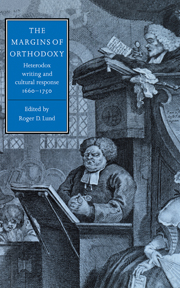Book contents
- Frontmatter
- Contents
- List of contributors
- Acknowledgments
- Introduction
- PART I THE IDEOLOGY AND ORIGINS OF HETERODOXY
- PART II LOCKE AND HETERODOX OPINION
- PART III POLICING THE MARGINS
- PART IV ORTHODOX DEFENSES, HETERODOX RESULTS
- 9 Deists and Anglicans: the ancient wisdom and the idea of progress
- 10 Henry Fielding and the problem of deism
- Select bibliography
- Index
9 - Deists and Anglicans: the ancient wisdom and the idea of progress
Published online by Cambridge University Press: 09 October 2009
- Frontmatter
- Contents
- List of contributors
- Acknowledgments
- Introduction
- PART I THE IDEOLOGY AND ORIGINS OF HETERODOXY
- PART II LOCKE AND HETERODOX OPINION
- PART III POLICING THE MARGINS
- PART IV ORTHODOX DEFENSES, HETERODOX RESULTS
- 9 Deists and Anglicans: the ancient wisdom and the idea of progress
- 10 Henry Fielding and the problem of deism
- Select bibliography
- Index
Summary
For much of the early modern period it was a commonplace to say that all true knowledge and wisdom had come from the East, and in the course of centuries had made its way by degrees to Europe and even to America. Typically, for James Howell in 1642, the transit of the arts and sciences was like the movement of the sun, traversing the world from East to West in endless cycles. The ancient wisdom, “budded first among the Brachmans and Gymnosophists in India, then blossom'd amongst the Chaldeans and Priests of Egypt, whence it came down the Nile, and crossed over to Greece … and bore ripe fruit.” Afterwards it found its way to Italy, and “then clamber'd over the Alpine hills to visit Greece and France, whence the Britaines and other North West Nations of the Roman World fetch'd it over.” Nor was it impossible, Howell concluded, “that the next flight it will make, will be to the Savages of the newly discovered World in America, and so turn round, and by a circular perambulation visit the Levantines again.” Not everyone was so optimistic, although the philosopher, George Berkeley, certainly held out the prospect for America when he set out for Bermuda in 1721.
The career of the ancient wisdom is, of course, much too vast a subject to attempt in this space. Indeed, it is a story that in its fullness still remains to be told.
- Type
- Chapter
- Information
- The Margins of OrthodoxyHeterodox Writing and Cultural Response, 1660–1750, pp. 219 - 239Publisher: Cambridge University PressPrint publication year: 1995
- 2
- Cited by



